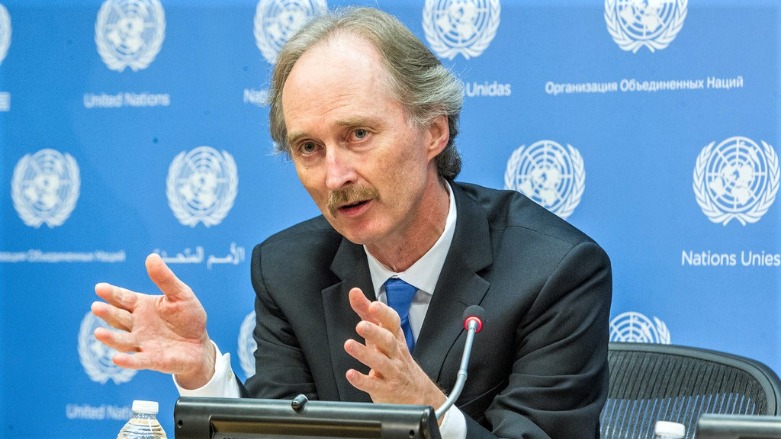Geneva Syria constitutional talks postponed for unclear reasons
The UN Special Envoy stressed the importance of foreign stakeholders to protect the Syrian process “from their differences elsewhere in the world.”

ERBIL (Kurdistan 24) – The United Nations Special Envoy for Syria, Geir O. Pedersen, announced on Saturday that the Syrian constitutional talks for this month have been canceled.
In a statement he said he regrets that the “UN-facilitated Constitutional Committee in Geneva from 25 to 29 July 2022 is no longer possible.”
The EU and the UK Syria envoys have also expressed dissapointment with the canceling of the talks.
“Hugely disappointing. Syrians desperately need this chance to meet and work out their own future, with the help of the UN,” Jonathan Hargreaves, the UK's Special Representative for Syria, tweeted on Monday.
The fate of millions of Syrians should not be a bargaining chip! Good faith engagement is paramount for a sustainable solution to the Syrian conflict through a genuine, inclusive political transition in line with UNSC Res 2254. I appreciate the efforts of UNSE @GeirOPedersen! https://t.co/YxBjAKv62w
— Dr Dan Stoenescu (@DanStoenescuEU) July 17, 2022
The EU’s Envoy to Syria, Dan Stoenescu, also told Kurdistan 24 that the EU “regrets” that the ninth session of the Syrian-led UN-facilitated Constitutional Committee was postponed.
Moreover, he underlined that "good faith engagement of all parties involved in the Syrian settlement is crucial to the success of the process.”
He also reaffirms the EU’s full support to the “UN Special Envoy’s efforts in that regard.”
United Nations Special Envoy for Syria, Geir O. Pedersen, also mentioned in his statement that it is important for stakeholders in Syria’s conflict to protect the Syrian political process “from their differences elsewhere in the world.”
The UN Special Envoy’s statement might be in reference to the Russia-Ukrainian war.
Asharq Al-Awsat reported on Monday that Damascus would not send its delegation to Geneva, due to Russian objections.
Moscow was reportedly dissatisfied with Switzerland joining Western sanctions against Russia due to the Ukrainian-Russian war.
Read More: Russia blocks UN aid to northwest Syria
Earlier this month, Russia also vetoed a one year extension of UN cross-border aid to northwest Syria. But later, the UN Security Council agreed on extending the aid for six months.
Aron Lund, a fellow at Century International and Middle East analyst at the Swedish Defense Research Agency (FOI), told Kurdistan 24 that the Constitutional Committee talks are a legacy of the Geneva process begun early in the Syria war, and have always been deadlocked.
“The idea that (Syrian president) Assad would negotiate a constitution that limits his own power and could help the opposition remove him, and that he would then agree to implement that constitution and abide by the outcome - frankly, it's ludicrous,” he said.
He underlined that Syrian president Bashar al-Assad has fought for over eleven years to avoid exactly this.
“The special envoy appears to try to use it to extract more realistic, useful things like prisoner releases, but he hasn't had much success so far,” Lund added.
But at the same time, Russians and Turks “pull and push their clients to facilitate or obstruct the talks, as they haggle over other items, like whether Erdogan should be allowed to invade Syria again.”
A tripartite meeting on Syria will be held tomorrow between the leaders of Iran, Turkey, and Russia, in which they will most likely discuss Turkish plans for a new operation against the Syrian Democratic Forces (SDF).
So far, both Iran and Russia have opposed a new operation.
Iran, Turkey and Russia are also the guarantors of the Astana peace process, which is seen as an alternative to the Geneva talks.
Edited by NA